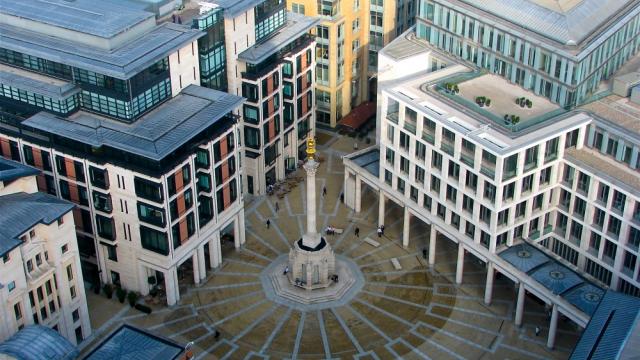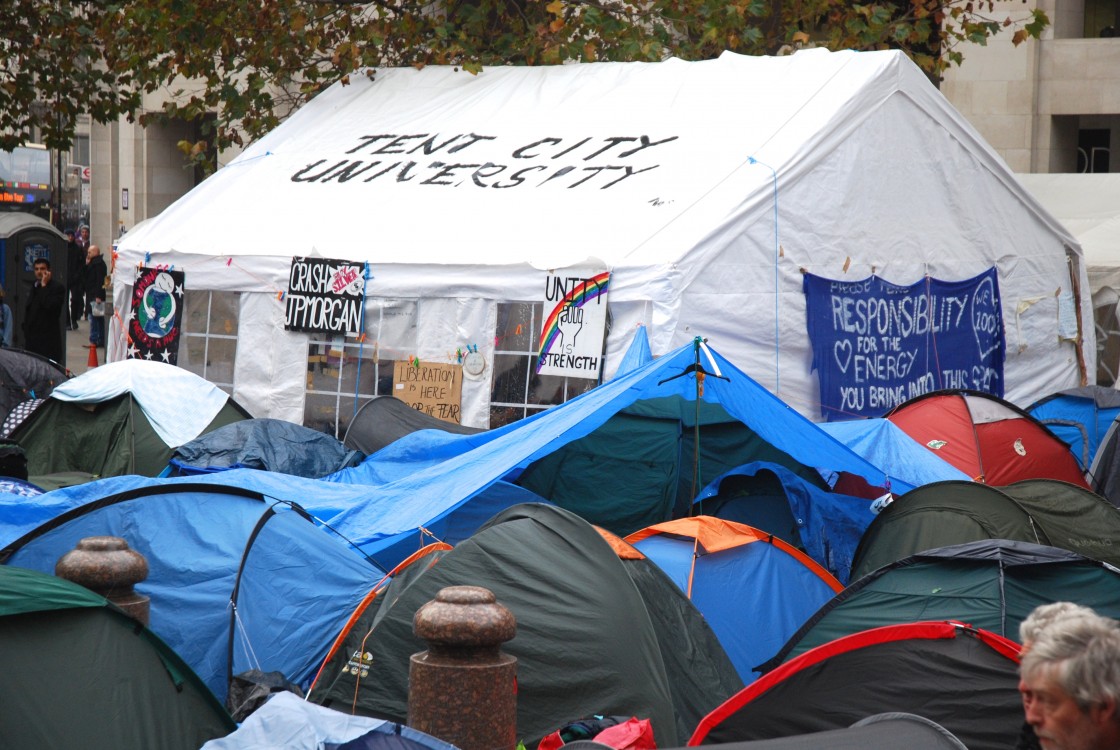
Just over two years ago, Paternoster Square in London spent the night of May 1 under the peaceful occupation of 50 to 100 Occupy activists. Though quickly removed by police, it marked a significant victory for the protesters: they had occupied the area outside the London Stock Exchange, something a larger demonstration in 2011 failed to do.
However, a new ruling will now classify Paternoster Square as a "city walkway," granting police the power to immediately clear the square without first having to obtain a court order. Expected to come into force in autumn, the ruling must first be approved by London's Planning and Transportation Committee and signed by the town clerk.
The increased protection for the square, which contains one of the country's most important financial buildings as well as several banks, is seen by some as a continuation of actions favoring the interests of financial institutions over public need.
“The government is now openly and unashamedly sending a message that it would protect its capital and its ideological perspective at any cost,” said a spokesperson for the campaign group Defend the Right to Protest.
Since the financial crisis of 2008, U.K. banks have paid out £67 billion ($112 billion) in bonuses according to the Office for National Statistics, and HM Revenue and Customs figures show that the country loses £4.7 billion ($7.9 billion) annually in corporate tax avoidance. Meanwhile, the Institute of Financial Services estimates that public spending will be 13.6% lower in 2018 than it was in 2010.
The City of London Corporation (CLC), London's municipal governing body, owns Paternoster Square. It was CLC that filed the high court injunction causing Occupy London's "tent city" to be dismantled outside St. Paul's Cathedral, following a four-and-a-half-month-long occupation that began in mid October 2011.
CLC has now struck a deal with Canadian-based real estate company Oxford Properties, which own the majority of buildings in the square and requested the new powers, including the ability to “restrict access to the estate in the case of a demonstration or terrorist threat.”
Claire McIntyre, vice president of Oxford Properties, said, “Our desire is to be able to continue to protect visitor and tenant safety.” McIntyre didn't comment on the implications for protests, but a CLC spokesperson claimed that “the corporation recognizes a fundamental right to peaceful protest.”
However, Defend the Right to Protest said in response to the decision: “This really is not a surprise. Measures to squash our civil and democratic right to protest have become commonplace.”
The right to protest in the U.K. currently falls under the 1998 Human Rights Act. Human rights campaign group Liberty states the law could be breached if “authorities prevent a demonstration from going ahead, halt a demonstration...[or] take steps in advance of a demonstration in order to disrupt it.”
The move is the latest measure in recent years to suggest an increase in "intelligence-led policing," whereby pre-emptive measures are used in an attempt to stop crimes before they happen.
In June of this year, the public learned that Scotland Yard has been keeping a secret database to track thousands of campaigners classed as "domestic extremists," who it says have either broken – or are about to break – the law. The database was found to contain people with no criminal record, including two Green Party politicians.
Prior to the royal wedding in 2011, a number of pre-emptive arrests took place based on largely undisclosed intelligence, with many individuals not released until after the event. No evidence was given to suggest that any of those detained had planned to disrupt the celebrations.
Several protests in recent years have also seen discouraging tactics carried out by police. In 2010, Kent Police admitted to breaking stop and search laws at Kingsnorth Climate Camp, and anti-fracking protests last year in Balcombe, West Sussex, resulted in just 29 convictionsfrom 114 charges.
“They used the section 14 orders and bail conditions to stop them from protesting,” Lydia Dagostino, the solicitor who represented most of the defendants, told the Guardian. "What they did criminalized protest.”
The tents that stood outside the London Stock Exchange in 2012 remained for mere hours, but the growing use of tactics seemingly designed to discourage protest, including Paternoster Square's new classification, could make similar action increasingly difficult and are seen by some as part of a gradual crackdown on public dissent in Britain.
“There does seem to be a growing encroachment of the protection of private interests of landowners over the democratic interests of the public,” said Dr. Lucy Finchett-Maddock, lecturer in law at the University of Sussex.
“The right to democratically resist is the bedrock of our constitution and as we know from conflicts elsewhere, if these liberties are removed, people do not just retire shyly forever.”
3 WAYS TO SHOW YOUR SUPPORT
- Log in to post comments














